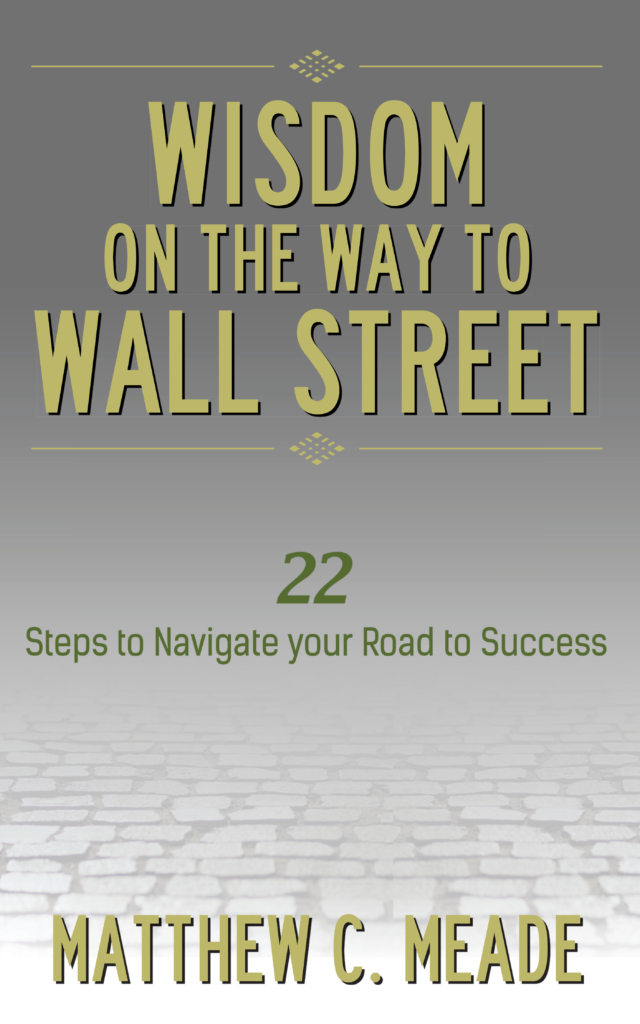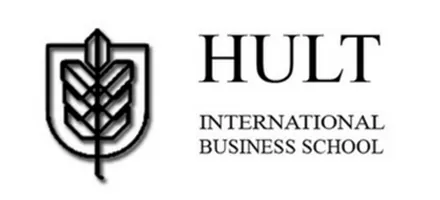
Matthew C. Meade
Matthew Meade has his fingers on everything at JP Morgan Chase. As a vice president, Meade leads a seven-member team that covers 99 trading desks and 15 lines of business across the globe. In a nutshell, his job is to make work easier for everyone else. He examines every possible metric across the firm, assessing their value and limits, he says. From there, Meade moves this data onto digital platforms so anyone can drag, drop, and trend it.
An unsung hero? More like the consummate team player. After all, Meade was once tapped to build a tech operation from scratch at JP Morgan Chase. He automated it so well that he wasn’t needed to run it. Don’t worry, Meade found plenty of internal suitors after he’d finished. To borrow one of his favorite phrases: “Good word comes from good work.”
EMBRACE DISCOMFORT
Now, Meade is spreading the word in a different way. This month, he published his first book, Wisdom on the Way to Wall Street: 22 Steps to Navigating Your Road to Success. For Meade, the book is a look back over a 15 year Wall Street finance career as much as a roadmap forward. Forget tutorials on reinvestment risk and swap spreads. Meade focuses on the lessons that Wall Street honchos often take for granted: relentless learning, quiet reflection, and authentic interaction.
“There are many trials and tribulations that you’ll encounter in life as well as in career endeavors,” he tells P&Q. “As a result, I put in place a roadmap of 22 principles to navigate the potholes, detours, and roadblocks to ensure a smooth and successful drive on your journey.”
One principle that resonates closely to Meade is Get Comfortable Being Uncomfortable. It stems from a truth that he has repeatedly witnessed on Wall Street: change is never-ending…and stagnation is lethal.
“If you aren’t comfortable being uncomfortable, you’re going to miss opportunities. If you get too comfortable doing the same things you’ve been doing for a long time, you’re not going to learn as much as you absolutely could.”
CAN DO ANYTHING IN FINANCE
Meade himself is an MBA student at New York University’s Stern School of Business, where is slated to graduate in 2021. He grew up in South Orange, New Jersey, in a family of six boys and two girls. His mother was a stockbroker, whose love of numbers carried over to her son. Eventually, he earned a scholarship to the University of Virginia’s McIntire School of Commerce. While he flourished in economics, stats, and finance – anything involving numbers – Meade also loved meeting people and learning about their experiences. It was a trait that led him onto the sell side after working as an analyst. Still, it is the ever-changing opportunities – as much as the people and numbers – that has anchored him to finance.
“From my perspective, within finance, there are so many different aspects to it,” he explains. “You don’t have to just do banking. You can do wealth management or risk management. You can do tech within finance as well; my team has done several tech projects. We have a strategy group within the firm that pretty much acts as a consulting team. These career paths within finance organizations are infinite. You’re just in it in a different way.”
What are some of the critical steps to thriving on Wall Street? Are 70-80 workweeks still relevant in finance? What have been some of Meade’s biggest lessons as an MBA? Check out our Q&A with Meade along with selected chapter summaries from his book.

P&Q: What inspired you to write a book?
MM: What inspired me was I talk at a lot of different schools in New Jersey about personal empowerment, different opportunities, and principles that help guide people to success. When I give these talks, there are a lot of questions they ask. One thing I thought is that I can’t speak at every single high school. I may as well put the thoughts in a book so they can refer to these different principles and utilize them to help them along their journey.
P&Q: Your book includes 22 steps. What are the two most important for MBAs in finance?
MM: I would say, first, Get Comfortable Being Uncomfortable. Often in finance, things change very rapidly within teams and technology. You want to be able to get comfortable with being uncomfortable because paths change, projects change – pretty much everything in different firms change over time as things grow and evolve. If you aren’t comfortable being uncomfortable, you’re going to miss opportunities. If you get too comfortable doing the same things you’ve been doing for a long time, you’re not going to learn as much as you absolutely could.
There have been opportunities that I, personally, passed up in my career because I was working on a single team. I knew the team and culture very well. I know the project I would be working on. At times, when I dared to take risks and jump out, those were the biggest growth opportunities. There were times within my career when I was very comfortable in different positions. The reason this principle made the book is because every time I was in that state – and then I left that state – they became the biggest learning opportunities that I’ve had.
For example, within the risk innovation space, I ended up taking the opportunity a few years ago. In that space, we are looking to digitally transform the way viewers look at metrics across our organization. My team covers 99 trading desks and 15 lines of business throughout the firm (Global Credit Trading, Global Rates, Global Management, etc.). We are trying to get rid of user tools, reduce operational risk, and increase efficiencies across the organization. In other words, give innovative ways for market risk to actually look at metrics. I was a different role prior to this for a few years, but I’m really glad I took on this role.
It was a new role. I hand-picked everyone on the team. We built the business from the ground up. The role was very entrepreneurial. I was learning about the technology within the firm and what it takes to transform a business from spreadsheets and Access to Tableau, digital dashboards, and trending data. It was a really good step for me. I got to build a team and transform a business until it got too digital and automated for me to even stay there. I saw the business from start to finish – and I sort of built myself out of a role. It’s a good feeling. You’re adding value to the firm. You’re getting rid of all that time that people were taking using Excel spreadsheets and Macros. Now, people are using their time to actually review the metrics or trend the metrics to see data trends – what’s going up, what’s going down, and why is it actually happening like this. There is a huge gain that comes from automation and innovation.
The second principle that’s very important to MBAs is Remembering Your Why. Within finance, you often work very, very hard. It’s a very rewarding career, but you work hard. There are going to be times when you feel tired or times when things are not going as well as you would have liked. You may have lost a transaction or you may be building technology and encountering a lot of challenges. If you remember your why, those things that got you tired or those things that seem like big hills to overcome become a lot smaller if you remember the reason you did it from the start.
About my why, I go back to impact. Impacting and inspiring others is my why. When I first got on to Wall Street, I was in a program called Sponsors for Educational Opportunity. They really looked to give people an opportunity to look back and be an inspiration. Impact is the one thing I really want to leave for the next generation. Remembering my why is the humble beginnings. I grew up in a family with five brothers and two sisters with my mom in New Jersey. My mom always told us to make sure we give back, be the best versions of ourselves, be respectful to people, and put 100% in all that you do. All that pushes impact as well.
Creating that impact and remembering my why is really about that next generation. I have my family now, but I’m also looking out for the next generation in finance. I want to create greater leadership opportunities for diverse individuals. You have to push the envelope, having those challenging conversations to make sure people feel included. My why also extends outside my job. That’s why I am meeting with kids in the community and talking to the schools.
P&Q: How long did it take you to write the book and what was the writing process like?
MM: It took me two years to write the book. The writing process itself was very therapeutic because there were times when I thought the book was done. Then I would come back and say, ‘Oh no, this principle is much more impactful than another principle.’ I think 22 principles is the number that I wanted because 22 is my birthday.
It was challenging – but a good thing – to make sure each of the principles were stand-alone principles and life-impactful for me. It was a fun process, but you had to make sure that I was making sure I had the best principles that I had crossed in my career in this book.
P&Q: You are a VP at JP Morgan and part of the finance industry for 15 years. What trait or skill have you seen be responsible most for success? Responsible most for failure?
MM: The skills that are most responsible for success is you have to be able to work well within teams. You have to help others realize their true potential when you’re managing or building teams. You have to be very driven and passionate. It is good to do something outside of your regular day job. Maybe you join a business resource group, a group that is different than you or your background. Networking is extremely important because a lot of people in the firm do different things. In big firms, it is important to learn about what people are doing and how it relates to what you are doing. Those are all very vital.
Some of the things that I’ve seen that haven’t work so well? Sometimes people don’t fail forward. When people do something wrong or have an error, they don’t address it quickly. I think that is very important to do because problems don’t age well. If you have an issue, you definitely have to address it fast. Another thing that keeps people from growing is sponsorship. You want to make sure you are developing sponsors around your organization. These are people who are talking on your behalf when you’re not in the room. You need that because it helps validate your work and who you are in the firm.
© Copyright 2026 Poets & Quants. All rights reserved. This article may not be republished, rewritten or otherwise distributed without written permission. To reprint or license this article or any content from Poets & Quants, please submit your request HERE.










